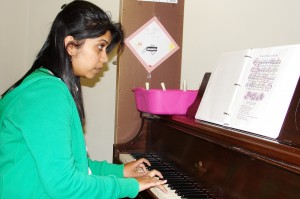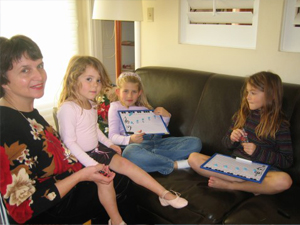Materials for Parents
The Motivation for Learning Music
Dear parents, there is much to be said about making work FUN for students.
Now, the main topic is the MOTIVATION – the motivation for learning music.
 1) The Value of Music
1) The Value of Music
After 42 years of teaching music, I have developed many insights that I’d love to share with my students and you, the parents. For nearly three decades, I devoted my life to teaching music and Russian in the former Soviet Union, where I ONLY used a traditional, classical teaching method. During the last ten years in the US, I have been a Suzuki teacher, a music teacher for children at risk, and a piano teacher at several successful music schools. Those years, from 2002 until now, have taught me about the importance of Motivating Parents.
I am often asked what music is needed for besides entertainment. It’s my strong belief that music is important not only because it “helps to develop mathematical abilities” (as some research claims), but first of all for its own sake. Math has its own music!
2) Music Forms the Characters of Students
There is no question about it: children involved in music differ from those who are not. They are better organized, and they know that having fun isn’t about consuming but rather about doing and learning. They develop tolerance towards unavoidable repetitions done for polishing the pieces they play. They develop their emotional sides and an ability to recognize good music.
3) People Come Back to Study Music… when They Become Parents
Those, who studied music in their childhood and quit, often come back when they have their own children. Often, these parents recognize how difficult it is to begin music training because of their own experience. When a whole family is enrolled in music lessons, parents don’t push their children to practice but rather spend time helping those children to learn how to practice. When parents and children practice together, they don’t lose interest!
4) How to Approach the Youngest Students

Their only work is play! Yes, in the early childhood (and this period officially lasts until 8 years of age), instructors and parents have to teach children through play.If you want tangible results sooner rather than later, try learning to read music together with your little one (age 3 to 7). Seven and eight year-old students can do it without parents’ help, but they still want you to be attentive to their learning process.
5) How to Help Your Child to Start

a) Stay motivated. Never say, “My child isn’t really interested.” This is just your own inability to engage your child. He/she only works with a teacher two-three hours per month – you must use the rest of your child’s time for his/her best learning advantage!
b) Start by getting an instrument.
A second-hand keyboard can be used for a couple of months, until you realize that getting something more serious (for instance, a digital piano with weighted keys) is a good idea. There are also plenty of upright pianos on the web. Just get one!
c) Be present at the lessons: use a recording device or a video camera, and make notes. Let the instructor teach you together with your child! Don’t be afraid to learn.
d) With younger children (age 3-5), try to use the same tools at home that the teacher uses in class. Establish a system of rewards for each task and get the child to judge his/her own job realistically.
e) Praise a lot, but don’t over-praise. Instead of copious amounts of praise, teach your loved one how to honestly earn rewards. Children can tell when praise is insincere. They want to be judged fairly, or else they will ignore you and lose interest in the rewards as well.
f) With the youngest children, try to play the same assignment yourself and let your child give you the rewards you earn! It’s fun for them to be able to praise you.
g) Organize your child’s working time in such a way that he/she approaches the instrument two-three times a day and spends no less than 30-45 minutes a day practicing.
h) Don’t push your child to just practicing, as young children don’t understand what that means! Make sure they know what they are working towards.
i) Stay personal, appreciative and trusting towards the teacher, and she will open up: this way, you’ll develop a strong bond among your child, you, and the teacher!





